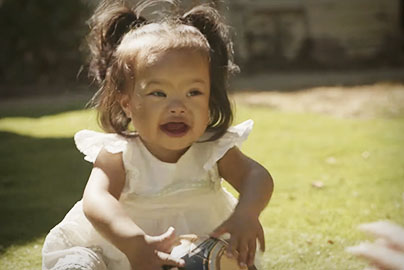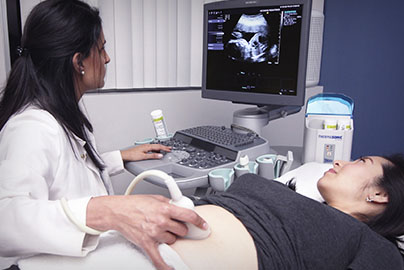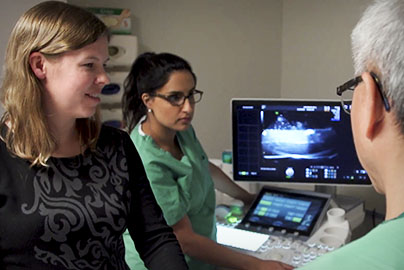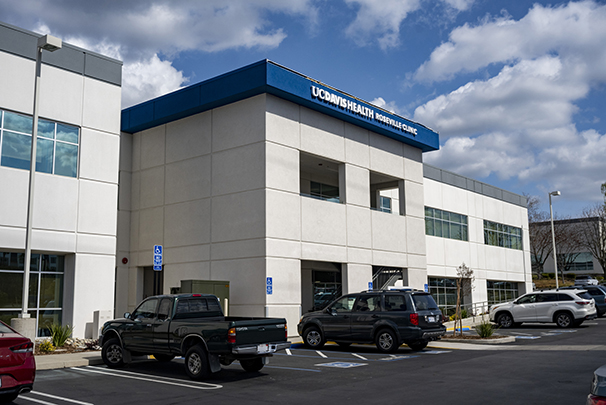Pediatric Heart Center
Fetal echocardiography
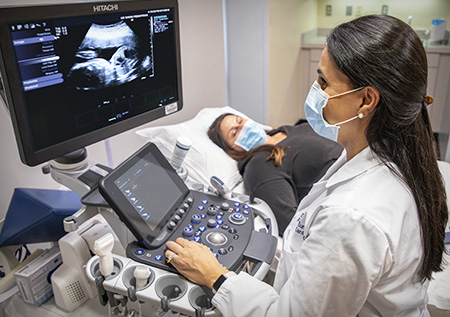
A fetal echocardiogram is an ultrasound of your unborn child’s heart. This test is used to look at the structure, function (or squeeze) and rhythm of the fetus’ heart.
The ultrasound is performed by a specially trained fetal cardiac ultrasound sonographer and the images are immediately interpreted by a doctor with specialty training in pediatric cardiology and fetal cardiology.
Find out more about the fetal heart | In Spanish | In Chinese | In Punjabi | In Russian.
Each year in the United States, some 40,000 children are born with congenital heart defects; worldwide about 1.5 million children are affected. Technology now permits cardiologists and surgeons to accurately diagnose abnormalities before birth and perform intricate corrections on newborns so that many affected children can lead normal lives.
A fetal echocardiogram is an ultrasound of your unborn child’s heart. This test is used to look at the structure, function and rhythm of the heart. The ultrasound is performed by a specially trained fetal cardiac ultrasound sonographer and the images are immediately interpreted by a doctor with specialty training in pediatric cardiology and fetal congenital heart disease.
Certain women are at a higher risk of having a baby with congenital heart disease. Current recommendations for a fetal echocardiogram include:
- In vitro fertilization (IVF) or assisted reproductive technology (as published, up to 2x the risk)
- Concerns on a routine obstetrical ultrasound
- Increased nuchal translucency
- Family history of congenital heart disease (1st degree relative)
- Abnormality of another organ system
- Abnormal fetal heart rate or rhythm
- Known or suspected fetal genetic condition
- Monochorionic twin pregnancies
- Abnormal maternal blood screening
- Insulin dependent diabetes mellitus
- Maternal phenylketonuria (PKU)
- Maternal autoimmune disease (lupus)
- Maternal use of certain medications
- Exposure to certain viral infections
- Presence of hydrops
The best gestational age for a fetal ultrasound is between 18 to 22 weeks. However, fetal echocardiograms can be performed as early as 16 weeks and throughout your pregnancy.
There are some heart abnormalities that cannot be detected prenatally, including mild valve abnormalities and small holes between the chambers of the heart. There are also some heart defects that are not evident until after the baby is born.
After the ultrasound, the doctor (fetal cardiologist) will immediately give you the results. If the ultrasound is normal, typically no other testing is needed. If heart defects are seen on the ultrasound, additional testing may be recommended. This may include additional echocardiograms, genetic testing, and consultations with other doctors (fetal surgeon, pediatric cardiothoracic surgeon, perinatologist, neonatologist).
-
UC Davis Fetal Surgery Patient and Family Testimonials
Patient StoriesHear from our UC Davis fetal care families
Patients and family members share their stories of prenatal care, fetal surgery, and continuing health journeys at the Fetal Care and Treatment Center at UC Davis Children’s Hospital.
-
Fetal care chat: What are echocardiograms and why are they important?
Advanced DiagnosticsAbout echocardiograms
In a Fetal Care Chat with the Fetal Health Foundation, Sherzana Sunderji, M.D., explains that fetal echocardiograms (also called fetal echos) are a specialized ultrasound that shows the structure of a baby’s heart and how well it’s working for expectant mothers.
-
Grapes and Jello: Tools for Practicing Fetal Heart Intervention
Provider TrainingTools for practicing fetal heart intervention
Using grapes embedded in a tub of jello, Frank Ing, M.D., of UC Davis Children’s Hospital is able to train doctors in fetal heart intervention. Using ultrasound, students find the “heart” in the jello and practice inserting a needle.
Referring physicians from other facilities, patients and families can contact us for more information about our fetal cardiology services including fetal echocardiography services. Please use our Fetal Care and Treatment Center Referral form to refer patients and request services.
For referrals, diagnostics and appointments
Email us
-
Main clinic location
Fetal Care and Treatment Center
Our fetal cardiology program is located within the Fetal Care and Treatment Center at UC Davis Children’s Hospital.
4301 X St. Suite 1501
Sacramento, CA 95817Contact number: 916-794-2229
-
UC Davis Health in Roseville
Pediatric cardiology clinic for evaluation and referrals.
1620 East Roseville Pkwy., Suite 200
Roseville, CA 95661Contact number: 916-794-2229
-
Prenatal Diagnosis of Northern California
Fetal clinic for evaluation and referrals.
5757 Pacific Ave., Suite A-132
Stockton, CA 95207Contact number: 916-794-2229


